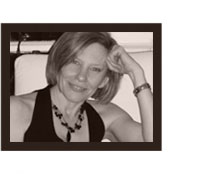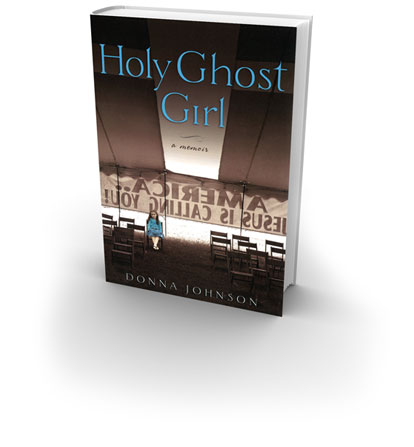Readers' Guide
"Doubt is a lot like faith; a mustard seed's worth changes everything" (p. 256).
An Introduction to Holy Ghost Girl, by Donna Johnson:
At seventeen, Donna Johnson fled Brother David Terrell and his Holy Roller crew to seek "the world with its … terrible beauty" (p. 236). But after decades of running, Donna still felt the pull of her past. So when circumstances summon her back to Terrell's revival tent, she finally confronts the conundrum of miracles and hypocrisy, faith and corruption that encompassed her young life.
Donna's mother, Carolyn, was a disgraced divorcee when she first heard the charismatic evangelist preach. Terrell "was a twenty-seven-year-old six-foot looker with black hair, blue eyes, and a smile that flashed Holy Ghost charm" (p.25). He offered her redemption, and she became his organist.
His ministry lived on the road, crisscrossing rural America's "sawdust trail." Exemplary behavior was expected from everyone. Even three-year-old Donna sat quietly while Terrell healed the sick, the lame, and the blind under their huge tent. But between revivals, she and her younger brother, Gary, ran wild, and played games like "husbands and wives" and "sinners" with Terrell's own children.
The faithful gave Terrell what scant cash and valuables they possessed. Still, their operation was expensive to run and "the situation was always dire" (p. 66). If it wasn't money troubles, it was the Ku Klux Klan threatening Terrell for preaching to un-segregated audiences, or the mainstream church condemning his heresies. He begged for money, exorcised the devil, and endured beatings and life-threatening fasts with the same righteous conviction.
Terrell's ministry steadily grew famous worldwide, and his new tent "accommodated anywhere from five to ten thousand people" (p. 141). Yet, success meant that the children were often shunted off with erratic caregivers for indefinite periods without explanation. Donna "figured that's how life was. Things happened, and then they were over. No hard feelings" (p. 155).
Then, Carolyn became pregnant with the first of her three illegitimate children with Terrell, and the true nature of their relationship became clear. She confided to Donna how "she believed [Terrell] would "do right" by her. All she had to do was pray and keep the faith" (p. 231).
As the 1960's gave way to the 1970's, Carolyn and thousands of others kept the faith. "Love offerings" (p. 241) bought Terrell vast estates and luxury cars, while also sustaining his multiple secret families. When he predicted the coming, apocalypse his followers poured into makeshift shantytowns and prepared for the end of the world—until the man of God went to prison for tax evasion.
After college, motherhood, and years of middle-class respectability, Donna had become a "doubt-ridden Episcopalian with Buddhist tendencies" (p. 4), but when she learns that Terrell's son, Randall, had died—and that the preacher planned to resurrect him—a lifetime's worth of buried memories came tumbling out.
Packing a wallop as powerful as Mary Karr's The Liars' Club and Jeanette Walls' The Glass Castle, Donna Johnson's Holy Ghost Girl is a haunting chronicle of childhood that illuminates the ultimate unknowability of the world and the harsh beauty of radical faith.
Suggested Questions for Discussion:
1. How much did you know about tent preachers before reading Holy Ghost Girl? What was your opinion of them and how did it change—if at all—over the course of the book?
2. Have you ever attended a revival meeting? How would you categorize your own spiritual beliefs?
3. Have you ever witnessed something that you couldn't explain? Did you let it sway your beliefs or did you dismiss it?
4. What does Johnson seem to be saying about the nature of belief when she discusses how her personal miracle came and went?
5. Why would Brother Terrell risk his personal safety defending blacks from the Ku Klux Klan while he "told racist jokes in private" (p. 55)?
6. A United Nations report indicates that the Pentecostal movement has "been the most successful at recruiting its members from the poorest of the poor." How would you explain this? What does this movement offer the poor that others do not?
7. It's always a little jarring when one begins to see a parent figure as a fallible human rather than a perfect being. Did Johnson's recollections of Carolyn resonate with memories of your own mother or father?
8. In what ways did Brother Terrell anticipate the broader, more mainstream evangelical movement? Are any of his teachings reflected in today's mega churches?
9. The idea that wearing Levis indicated that "Donna has been taken over by a lesbian spirit" (p. 234) seems preposterous today—and even to Terrell in the 1960's. Can you think of anything considered taboo today that might be accepted unblinkingly twenty or thirty years from now?
10. Johnson opens her book with news that Terrell plans to try to raise his son Randall from the dead. How did this prepare you for the story that she was about to share?
11. Compare Holy Ghost Girl to other coming-of-age memoirs you've read and enjoyed. Is there a common thread that draws you to these stories?

